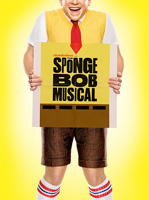
THEATRE REVIEW | ‘A TREE GROWS IN BROOKLYN’
Still Looking for Joy Under the Brooklyn Bridge
By CHARLES ISHERWOOD
Published: February 12, 2005
Splendidly sung, and staged with evident care, Gary Griffin’s production doesn’t press too hard in reanimating the gentle varied charms of this 1951 musical. It offers them up in the affectionate spirit of a loving parent who knows the children don’t get along too well but can’t imagine choosing a favorite.
Based on the popular novel by Betty Smith, the musical, with a book by Smith and George Abbott, music by Arthur Schwartz and lyrics by Dorothy Fields, the original production opened to a bouquet of fine reviews. In The New York Times, Brooks Atkinson said it “turns out to be one of those happy inspirations that the theater dotes on.” But audiences didn’t dote indefinitely. The show closed after a respectable but disappointing run of 267 performances.
The original cast album has long been championed by musical theater aficionados, who have pondered the why’s and wherefore’s of the production’s failure. Mr. Griffin’s staging at City Center, which uses David Ives’s sensitively shaved version of the original book, affirms a popular hypothesis that the show suffered from an identity crisis brought on by the casting of a star, Shirley Booth, in a supporting role.
Booth, who played Cissy, the wised-up sister of the musical’s putative heroine, Katie, was such a charismatic comedienne that the comic subplot detailing Cissy’s dalliances with a series of lovers, all of whom she chooses to call Harry, for convenience, stole a march on the darker central story line. That concerns Katie’s troubled marriage to a drinking dreamer named Johnny Nolan, and their bookworm daughter Francie (the novel’s heroine).
A recent Goodspeed Opera House production returned to the source material to construct a new book that would readjust the balance, but Cissy, or rather Booth, ended up with so much of the music that the old score didn’t quite fit the new book, and the Encores! mandate is to place musical priorities above all others.
And so the show remains a likable but less than compelling patchwork, the impulses of its flavorful score divided among, in fact, three worthwhile aims: to bring alive the roistering, colorful atmosphere of the immigrant neighborhood in which it is set, to scare up laughs through Cissy’s quest for marital bliss and to moisten the tear ducts with the story of Katie and Johnny’s doomed romance. It delivers on all three fronts but still adds up to less than the sum of its parts.
To lose any of Cissy’s turns at center stage would be a shame, since Emily Skinner, a gifted singer with ample comic capabilities, has been cast in the role. Ms. Skinner can’t re-create the inimitable delivery of Booth (and shouldn’t be asked to try), but she is a far better singer. She delivers “He Had Refinement,” the comic highlight of the score, with a shapely blend of musical polish and earthy humor, tossing in the occasional bleated note by way of homage to Booth’s distinctively unpretty vocal coloring. Ms. Fields’s lyrics, in Cissy’s wistful résumé of her first husband’s charms, are worth savoring: “He would never sit down to eat without his shirt was on/ Or come out of the bathroom dripping like a dying swan/ Or call a visitor a slob until the slob was gone/ He had refinement.”
Ms. Fields and Mr. Schwartz also proved a fine match for the score’s more reflective moments. Aside from the show’s wry populist wit, its most enduring ingredient may be its clear-eyed acknowledgement that youthful dreams tend to wither rather than bloom with the passing of time. In “Growing Pains,” a tender duet set to a subtle melody, Johnny and Francie ask the unanswerable question, “Why do we get to know/The things we don’t want to know?”
Jason Danieley, a natural charmer, is an ideal Johnny Nolan. His singing is sensitive, pure and gorgeously robust, as it should be: Johnny’s a failure at everything but spinning out his dreams in song. If Mr. Danieley doesn’t quite capture the full pathos in this likable ne’er-do-well, a Brooklyn Billy Bigelow, it’s primarily because the character always seems to be off to the saloon, a victim of the show’s episodic narrative, which stretches across a couple of decades.
Sally Murphy, who plays Katie, is likewise a superb singer, and well cast as a dreamy-eyed youngster who learns life’s harder lessons long before her beloved does. We can measure the toll her life takes on Katie by the shrinking wattage in Ms. Murphy’s smile, and her performance of the show’s best-known song, “Make the Man Love Me,” hits the right quietly rhapsodic note.
There are nice, idiomatic supporting turns by John Ellison Conlee, as Cissy’s latest and last Harry, and Nancy Anderson, as Katie’s friendly romantic rival, Hildy. (“What’s that you’re readin’?” she asks Francie, with a tinge of suspicion and awe. “A book?”) The choral numbers are infused with jaunty charm redolent of both period and place, and Sergio Trujillo’s choreography skillfully riffs on social dances, with a special tip of the hat to the Irish. (The “Halloween Ballet,” on the other hand, is scary in the wrong way.)
The score couldn’t be in better hands than those of Rob Fisher, the Encores! music director. Under his supple conducting, the orchestra delivers with the warmth and verve we’ve come to expect but should remember to cherish.
